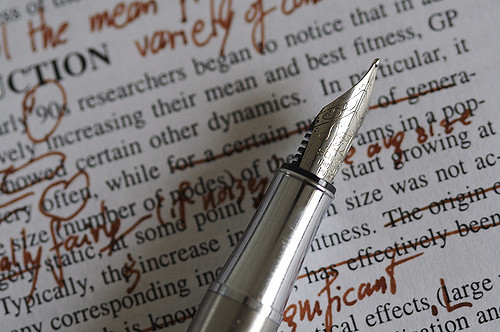
Ready, set . . . edit.
It’s December, and NaNoWriMo 2018 is history. Forgoing Netflix binges and holiday preparations alike, your retinas are seared by long nights of blinking cursors and you have emerged triumphant (if exhausted) 50,000 words later. A newbie novelist might be ready to slap a cover on that mess and CreateSpace her way to a Hugo or Pulitzer, but not you—you know that this is where the real work begins. If November is for writing, December is for editing, and we’re here to help whip your manuscript into shape. Confused about the different levels of editing available to you in the publishing world? Read on.
DEVELOPMENTAL EDITING
Pull out the big guns, because developmental editing (sometimes referred to reciprocally as content or substantive editing, depending on how an individual editor defines the work) changes everything. Did you get so caught up in your world building that you can’t see the forest for the trees? Developmental editing takes a big picture approach with your story, putting elements like plot and overall tone and character development under the microscope to ensure that you have a viable story. Let’s face it: a lot of things can get overlooked in the race to that word count finish line . . . things like narrative pacing, consistency of voice and tense, and character motivation. Even the best writers can find themselves 49,999 words and 29 days into NaNoWriMo with plot holes the size of lunar craters. Developmental editing, often a back-and-forth process between the writer and the editor, seeks to address such issues. This type of editing requires intense focus, commitment, and an open mind with a clear eye to your end goal—it may humble you, but your novel will emerge stronger in the long run.
LINE EDITING VS. COPYEDITING
Now that you’ve got a story, you’re ready to focus on use of language and to make sure all your i’s are dotted and your t’s are crossed. Line editing will look at how you use your words, combing the text for problems like redundancy, awkward or unclear phrasing, lackluster word choice, or unwieldy sentence structure. While line editing may address issues that copy editing will fix, line editing does so with a focus on style first. Attention to detail is key in this step, and that same back-and-forth process between the editor and author may transpire. Copyediting (or copy editing, depending on your editorial preference) is your freshman comp teacher and her savage red pen, pointing out all your comma flubs and subject/verb agreement issues (and anything that spell check missed). Both levels of editing are necessary for a truly polished piece, and you may find editors who combine the two for maximum efficiency.
PROOFREADING
This is the last level of editing. At this stage, your novel is essentially finished and most of the glaring errors have been corrected. Just the same, it’s wise to have just one more pair of eyes on your book before it hits the press. Don’t think it’s necessary? Imagine how embarrassed the author of The Vocabulary of East Anglia would have been had he lived to see this tragic error at the beginning of this 1830 edition:

BUT I DON’T NEED AN EDITOR—I HAVE A BETA READER!
Beta readers are wonderful and necessary. They’ve got great insights, and a lot of them have a pretty handy knowledge of all things grammatical. Often, your beta readers are friends or family members, and while they mean well (and are far cheaper than editors), they’re not professionals. Stephen King is supposed to have said, “Only enemies speak the truth; friends and lovers lie endlessly, caught in the web of duty.” Bottom line? Good editing is expensive—easily the most expensive part of your entire publishing endeavor—but it’s worth it for a polished, professional product. You didn’t spend all November writing your heart out to produce anything less than your best.
*Please note that editors may define the levels of editing differently depending on their expertise and editorial rates.


Merry Gordon is silently correcting your grammar. A freelance editor and writer, Merry also has nearly two decades of experience teaching English at the high school and college level.
Ready for some editing help? Click here to learn about Pink Umbrella Editing Services, and follow our blog for writing and editing tips.


Leave a comment